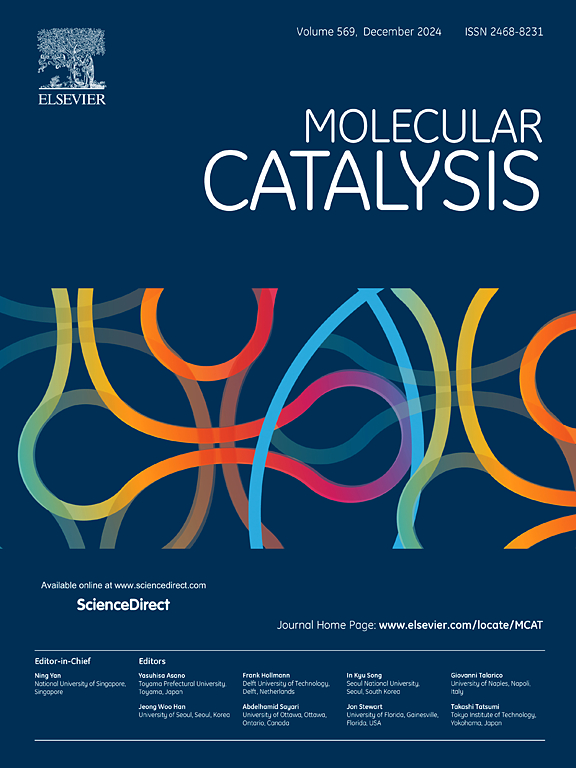One-step direct immobilization of engineered prenyltransferase on polystyrene for prenylated flavonoid production
IF 3.9
2区 化学
Q2 CHEMISTRY, PHYSICAL
引用次数: 0
Abstract
Enzymes are highly efficient and specific biocatalysts. However, they are unstable and prone to deactivation, which limits their practical applications. To address these challenges, immobilization technology has been developed. Traditional immobilization methods typically require purified enzymes, but enzyme purification is often time-consuming and labor-intensive. Therefore, this study aims to develop a one-step method that directly purifies, adsorbs, and immobilizes enzymes from crude extracts, while simultaneously enhancing their activity. In this work, we examined the importance of the location of anchoring peptide (LCI) in fused enzyme functionality and binding affinity across various materials. LCI was fused with Aspergillus fumigatiaffinis prenyltransferase (AfPT) at the N-terminus to obtain the fusion enzyme LCI-AfPT, which displayed maximum load (38.9 mg/g) and highest activity recovery (92.7%) on polystyrene (PS). The free enzyme LCI-AfPT exhibited highest activity at pH 8.0 and 40°C. The highest activity of LCI-AfPT@PS was achieved at pH 7.5 and 55°C, with over 70% residual activity after 4 hours of incubation at 55°C. The tolerance of LCI-AfPT@PS to ethanol and methanol was significantly higher than that of LCI-AfPT. Immobilization significantly improved substrate affinity (Km reduced from 0.273 mM to 0.09 mM) and organic solvent tolerance, with no activity loss in ≤10% ethanol/methanol, highlighting its potential for industrial biocatalysis of hydrophobic flavonoids. The Kcat/Km value of LCI-AfPT@PS reached 0.072 s-1· mM-1, which was higher than that of LCI-AfPT and AfPT. LCI-AfPT was directly immobilized on PS from crude enzymes without purification, with a high adsorption selectivity of 80.5%, which was about 8-fold higher than that of AfPT. LCI-AfPT@PS retained 70% of its original activity after 10 cycles of reuse, resulting in a total of 4.4 mM of 3’-C-prenylnaringenin. This study represents the first investigation on the one-step purification and immobilization of prenyltransferase using an anchoring peptide, and its application in the efficient production of prenylated flavonoids.

工程丙烯基转移酶在聚苯乙烯上一步直接固定化制备丙烯化类黄酮
酶是高效、特异的生物催化剂。然而,它们不稳定且容易失活,这限制了它们的实际应用。为了解决这些挑战,开发了固定技术。传统的固定化方法通常需要纯化酶,但酶的纯化往往是费时费力的。因此,本研究旨在开发一种一步法,直接纯化、吸附和固定化粗提取物中的酶,同时提高酶的活性。在这项工作中,我们研究了锚定肽(LCI)在融合酶功能和不同材料结合亲和力中的位置的重要性。将LCI与烟熏affinis烯基转移酶(AfPT)在n端融合得到LCI-AfPT融合酶,该融合酶在聚苯乙烯(PS)上的负载最高(38.9 mg/g),活性回收率最高(92.7%)。游离酶LCI-AfPT在pH 8.0和40℃时活性最高。LCI-AfPT@PS在pH 7.5和55°C条件下活性最高,在55°C条件下孵育4小时后剩余活性超过70%。LCI-AfPT@PS对乙醇和甲醇的耐受性显著高于LCI-AfPT。固定化显著提高了底物亲和力(Km从0.273 mM降低到0.09 mM)和有机溶剂耐受性,在≤10%的乙醇/甲醇中没有活性损失,突出了其在疏水类黄酮工业生物催化方面的潜力。LCI-AfPT@PS的Kcat/Km值达到0.072 s-1·mM-1,高于LCI-AfPT和AfPT。LCI-AfPT不经纯化直接固定在PS上,吸附选择性高达80.5%,是AfPT的8倍左右。LCI-AfPT@PS经过10次循环后,保留了70%的原始活性,得到4.4 mM的3’- c -丙烯基柚皮素。本研究首次研究了利用锚定肽一步纯化和固定化戊烯基转移酶,并将其应用于高效生产戊烯基类黄酮。
本文章由计算机程序翻译,如有差异,请以英文原文为准。
求助全文
约1分钟内获得全文
求助全文
来源期刊

Molecular Catalysis
Chemical Engineering-Process Chemistry and Technology
CiteScore
6.90
自引率
10.90%
发文量
700
审稿时长
40 days
期刊介绍:
Molecular Catalysis publishes full papers that are original, rigorous, and scholarly contributions examining the molecular and atomic aspects of catalytic activation and reaction mechanisms. The fields covered are:
Heterogeneous catalysis including immobilized molecular catalysts
Homogeneous catalysis including organocatalysis, organometallic catalysis and biocatalysis
Photo- and electrochemistry
Theoretical aspects of catalysis analyzed by computational methods
 求助内容:
求助内容: 应助结果提醒方式:
应助结果提醒方式:


